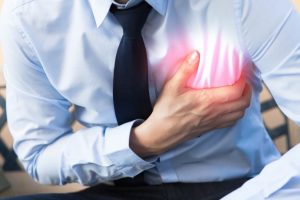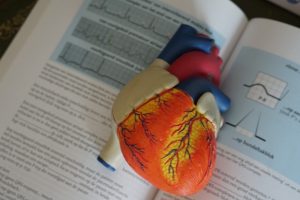If you have had a heart attack or other heart problem, or have undergone a heart surgery of any kind, your cardiologist must have referred you to do supervised cardiac rehabilitation exercises.
Cardiac rehab is an extremely important part of your recovery:
- It helps preventing another –more serious– heart attack,
- Helps you follow a heart-healthy lifestyle,
- Improves your level of activity and
- Guarantees better outcomes after your surgery. [1]
According to the latest 2019 estimate, it is estimated that around 7.4 million UK residents are living with cardiovascular disorders. [4]
Indeed, there is only a limited number of cardiac rehab centres across the City of London.
That’s why it might be difficult for you to travel to the rehab centre is in order to attend your session.
I know what you’re thinking…
You definitely wish London had a programme that offers cardiac rehabilitation exercises online.
Good news is: your dream has come true.
But, because participating in an online cardiac rehab programme is highly sensitive, you need to read this article carefully before taking your next step.
Bringing Cardiac Rehab to your home
Thanks to technology, you can do anything from the comfort of your home away from London’s busy streets; including rehabilitation.
You might have seen a countless number of people hiring online rehab specialist to recover from a health problem.
And there comes a thought to your mind:
“Those who brought rehabilitation to their home are having a less threatening problem than mine.”
Of course, a reconstructed ACL or a repaired shoulder cannot be compared to an open heart surgery.
However, with the help of an expert cardiac rehabilitation specialist London based, you can continue your rehabilitation programme safely without the need to travel away from home.
Still worried?
Here’s a checklist that lets you know if your cardiac rehab programme online is safe and applicable:
1. Get Your Clinician’s Approval
Whether you have had a stent or you have a heart failure, you always need to get the permission from your clinician to get enrolled in a cardiac rehabilitation programme.
If you’ve already participated in a cardiac rehab programme at an outpatient rehab center, and you have been discharged by your physiotherapist, then you’re mostly ready to continue your rehab from home. [2], [1]
2. Find a Professional Cardiac Rehab Specialist
Not all rehab specialists are qualified to offer you a cardiac rehab programme,
So, after any cardiac event, you have to take it easy and progress gradually in a supervised manner.
That’s why, before setting off, you need to:
- Select your rehab specialist carefully,
- Spend a reasonable time discussing the possible plans for you,
- Give a detailed history about your medical condition and
- Provide all the medical records and investigations you have.
3. Learn To Monitor Your Exercise Intensity
A good cardiac rehab specialist will not wait for your chest pain to appear before he stops you.
Instead, he will use some simple tools and tests to decide whether your exercise is of the right intensity and keep you exercising within the zone of the safety. [14]
4. Make A Comprehensive Change
Cardiac rehab doesn’t only mean getting more active after a major heart event.
But, it also means adopting more heart-friendly habits like following a specific low-fat diet, watching your weight and making sure you are stressing less about everything. [11],[14],[10]
Now make your own list, and if all the items are checked, your cardiac rehab programme will be both effective and safe.

In order to get your heart stronger right from home, you have to get a cardiac rehab programme that is personalised for you depending on:
- The nature of your heart problem,
- Your current level of activity,
- The stage of rehabilitation you’ve reached,
- Your rehabilitation goals and
- The availability of special monitoring devices. [14],[9]
Everyone’s programme is different
In cardiac rehab, you cannot simply do an exercise because it’s recommended by a friend.
You cannot also get back to exercises you used to do in the past.
Because everyone’s condition is different, you need a rehab programme specially tailored for you.
For instant, if you have had a myocardial infarction or have some degree of heart failure, you definitely don’t want to do exercises that may put extra load on your heart muscle. [6], [7], [8]
And if you are recovering from an open heart surgery, you must be looking for a cardiac rehab specialist who would check your chest X-ray and make sure your chest bone is healed before giving you upper body exercises to do. [9],[15]
A professional cardiac rehab specialist takes all this –and more– into consideration.
A Customised Endpoint
Believe it or not, customising a London cardiac rehab programme doesn’t only mean listing the exercises that you are allowed to do,
but also deciding the best way to monitor your performance during the session in order to set your safe endpoint. [6], [7], [8], [9]
In fact, your professional cardiac rehab specialist doesn’t need to be there to monitor your performance.
For instance, he might:
- Use the simple talk-test
- Ask you to take your heart rate using a mobile application or a smart band if you’ve one
- Use an evidence-based chart or a scale (e.g. Borg’s scale, RPE scale)
- Recommend a portable pulse oximeter. [9],[8]
Worry no more; your professional rehab specialist will keep an eye on you throughout the session.
In addition, he will give you the confidence and teach you how your monitoring process goes so that you can exercise safely.
Progression plan tailored for you
Your progression must be slow and well-monitored
So, as you exercise with London’s number one elite personal trainer cardiac rehabilitation specialist, Jazz Alessi, you will be told exactly when you are moving to the next stage and how much you have improved so far.
This will be done by using objective, evidence-based tests as I assess you at the beginning of your rehab journey
Guess what? Again, all tests can be done right from home and –for most of them– with no special equipment.
If you would like to talk to a professional about your health condition, and find out if you will benefit from a cardiac rehab programme, feel free to request a free consultation with Jazz Alessi who will answer all your questions about cardiac rehabilitation.

Cardiac Rehab Online: Are you a Candidate?
With the COVID-19 outbreak, travelling to the rehabilitation centre is now less applicable than ever.
Especially in London; where there are only 29 registered cardiac rehab programmes. [5]
With this limited number of cardiac rehab centres, driving across the city may not be the right thing to do.
However, nowadays, technology has brought most of our offline activities to where we are.
Why not make your cardiac rehabilitation one of them?
You must be wondering whether my online cardiac rehabilitation programme is suitable for you.
In fact, almost all heart conditions are allowed to be part of this programme.
Indeed, there are some strict conditions and criteria that you must meet. For example you must:
- Be referred for cardiac rehabilitation by your cardiologist or cardio-surgeon at an earlier date. Or
- Be discharged from the cardiac rehabilitation centre, Or
- Have discontinued cardiac rehab at the centre after completing at least phase II of cardiac rehab.
- Medically stable with or without medications and
- Having all your medical records handy for your rehab specialist to check them. [9],[8]
If you meet these criteria, it is 100% safe for you to participate in an online cardiac rehabilitation programme.
Depending on the heart event you’ve encountered, cardiac rehabilitation London based (or online) will bring countless benefits to your life.
If you are recovering from any of the following heart events, this online cardiac rehab programme is your ticket to a faster recovery:
- Heart attack
Exercise after a heart attack is crucial. In fact, adding exercise to your medical care programme decreases your risk of developing more cardiac problems by 26%. [7]
In addition, it is safe to begin your outpatient cardiac rehab two to four weeks after being discharged from the hospital. [7],[15],[9]
- Stable Angina
With the help of London’s number one cardiac rehab expert, you can exercise under remote supervision and make sure you exercise within the safe window that will not elicit your symptoms. [8],[9]
Exercising will help improve your physical capacity and will also help your coronaries deliver more blood to your heart.[8],[14]
- Heart failure
If you’ve heart failure, cardiac rehab will improve your functional status and prevent developing further complications. [6]
There are around 200,000 new diagnoses with heart failure every year in the UK and only a limited number of rehab centres in London. [3],[5]
So, it is a better choice to get your heart stronger without the need to drive across the city of London, and still get the same benefits as traditional rehab.
- Closed and open-heart surgeries such as:
- Heart transplant
- Angioplasty or stent placement
- Open heart surgery, including bypass and valve replacement or repair
- Ventricular assist device placement
Continuing cardiac rehabilitation after one of these surgical interventions not only does improve the outcomes of your surgery, but also gives you a stronger heart and lungs and gets you nearly as active as you used to be. [9]
It is extremely important to discuss everything about your medical history before you are considered for cardiac rehab.
This includes all your investigations, labs, imaging results, medical reports and the medications you are currently on.
Paying attention to the smallest details is what helps me set you the most effective online cardiac rehabilitation plan in London.
It also helps me set realistic, achievable short and long-term rehab goals.
Change Your Life: Have a Cardiac Rehab Programme
Unlike what you’ve expected. Cardiac rehabilitation doesn’t only mean specific exercises.
Although exercising is an indispensable part of the rehabilitation plan.
There are also other measures that – together – contribute to a successful, beneficial rehabilitation.
Remember, the benefit you get from exercising is doubled and even tripled when you follow your holistic treatment plan correctly. [12], [14], [15]

Here is what your cardiac rehab is all about:
- Medical Plan
No matter what your heart problem is, your physician will always prescribe some medications that are necessary for your case.
Always make sure you take your pills on time and attend to your physician’s clinic for follow-up according to your pre-set schedule. [8]

- Nutrition Plan
After a cardiac event, you need to follow a specific diet plan that will help you:
- Reduce the bad lipids in your blood,
- Keep your blood pressure within normal level,
- Reduce your body weight,
- Keep your electrolytes balanced and
- Provide your body with the right amount of nutrients. [10]
- There is more crucial nutritional points you must take into consideration. Due to limited space and article length I couldn’t list everything here however, – we’ll discuss everything from the inside out during this FREE CONSULTATION.
- Stress Less
In order to keep your heart healthy, you need to get rid of your stress.
Stress only affects your body, heart and soul negatively.
It leads to many physical and behavioral disturbances such as:
- Hormonal disturbances,
- Increased or irregular heart rhythm,
- Increased blood pressure,
- Increased blood sugar,
- Binge eating and
- Sleep disturbances. [11]
In a cardiac rehabilitation programme, stretching, Pilates, Yoga and meditation can help you get rid of your stresses.
- A new set of Habits
In your rehab journey, you will have to quit all your toxic habits (like drinking alcohol and smoking), and start adopting consistently new heart-friendly habits like healthy eating and regular exercise. [14]
- Regular Exercise
Last but not least: exercising.
Exercising is a cornerstone in any cardiac rehab programme.
Later in this article, you will learn more about how exercise can help your heart.
Is Cardiac Rehab Right for Me?
After a major heart event, starting or resuming an exercise routine may seem scary, complicated, unsafe or exhausting.
In other words, it might be the last thing you’d want to do.
But the truth is… It probably should be one of the first.
To be honest, exercise is as much important as aspirin, statins or beta blockers in your cardiac rehabilitation programme.
Of course I understand that: even though you know how important exercising is, you are still scared to get active.
Maybe because you are no longer sure what you are capable of
Or you have no idea how to start and where to stop.
What you’ve been through is not easy.
This is why you need full support and professional supervision.
I have some wonderful news that will get you started:
According to the National Audit of Cardiac Rehabilitation’s 2019 report, 77% of patients in the UK meet recommended activity levels at the end of their cardiac rehab programme. [5]
This means: with the proper cardiac rehab programme, you can get as active, energetic and independent as you used to be.
According to the American Association of Cardiac and Pulmonary Rehabilitation (AACVPR), you can benefit from home-based cardiac rehabilitation, if you’ve a history of:
- Myocardial infarction (heart attack).
- Coronary artery bypass graft surgery (CABG).
- Current stable angina pectoris.
- Heart valve repair or replacement.
- Percutaneous trans-luminal coronary angioplasty (PTCA)/ or coronary stenting.
- Heart or heart-lung transplant.
- Chronic heart failure.
- Specific types of arrhythmia.
- Specific degrees of valve prolapse not indicated for replacement.
- Specific degrees of valve stenosis not indicated for replacement.
- Specific grades of dilated cardiomyopathy (DCM). [2]
If your health-problem is not included in this list, you might still be a candidate and you may benefit from a cardiac rehabilitation programme.
To discuss your case with Jazz Alessi, London’s number one elite personal trainer London based – cardiac rehab expert, request an in-person consultation for free – here
How Cardiac Rehab Can Help Heal Your Heart
Cardiac rehab can have many benefits to your health in both the short and long-term.
It is not simply a matter of making your heart stronger.
Cardiac Rehab is a comprehensive rehabilitation plan that will create a better version of you and help you live a better life even with a heart problem.
Here are some benefits of cardiac rehab for your…:
- Heart and Lungs
When you are following a cardiac rehabilitation program, your heart and lungs will improve dramatically. Cardiac rehab exercises will:
- Give you A lower resting heart rate,
- Help your heart pump blood more efficiently,
- Make you breathe more easily during activity,
- Correct your breathing pattern,
- Improve your physical capacity,
- Improve your functional capacity ,
- Reduce your symptoms and
- Reduce your risk of developing complications, getting re-hospitalised and developing other health problems [5], [12]
- Blood and vessels
Blood and vessels are very important components of your body.
With the heart, they form your cardiovascular system which is responsible for carrying the blood from the heart to every single cell in your body and bring it back all along.
This process provides your cells with the oxygen they need to be alive and function properly.
When your heart is affected by any cardiac disease, your vessels, blood and cells are also affected.
So, let me explain how exercising can help improving the condition of your blood and vessels:
- It lowers your resting blood pressure
- Improves your haemoglobin level (the hormone responsible for carrying oxygen all over your body)
- Improves your cells and muscles’ ability to utilise oxygen. [5], [13]
- Cells and Metabolism
Exercising as a part of cardiac rehab will bring huge benefits to how your body produces and consumes energy.
For example, customised exercise will:
- Improve glucose utilisation, which means a better energy production.
- Regulate your hormones.
- Help you burn fats and lose weight.
- Improve your cells’ ability to repair.
- Increase the number of your immune cells. [5], [12], [13]
- Mind and psychology
Exercising after a serious heart event will help you
- Regain your confidence,
- Conquer your fears,
- Improve your mood and
- Help you get rid of your stress. [11],[5]
With all these benefits, I believe that nothing is as good as a home-based cardiac rehabilitation programme that:
- Rewards you with a unique type of care and
- Meets all your expectations in the comfort and safety of your own home.
What Should I Expect?
If you choose to attend for an offline cardiac rehabilitation programme, you have a lot to expect.
Because safety is our very first concern, you will have a pretty long talk with the programme staff.
Be patient!
This talk is of great importance because it will help us retrieve important information about:
- Your medical history
- Medications
- Lifestyle
- Risk factors
- Rehabilitation goals
Along with this information, you will be required to bring your previous medical reports, investigations, lab results and any other reports related to your current or previous health problems.
This will help Jazz Alessi set you a very unique rehabilitation plan that is tailored specially to be the shortest way to your very personal goals.
It will also help him make your exercise safe and effective.
When you arrive for class, you’ll typically weigh in; place a couple of patches on your chest, and hook up to a heart monitor.
This device allows Jazz Alessi to monitor your heart rhythm while you exercise.
Next, you’ll get a resting blood pressure measurement and will be asked answer questions like:
- How are you feeling now?
- How did you feel after your last cardiac rehab session?
- Any changes in your medication?
- Have you got enough sleep last night?
- Have you drunk at least 2-3 litres of water in the past 24 hours?
- When was the last time you ate today?
- What did you have for your last meal?
- Have you experienced any symptoms or discomfort in the past 24 hours?
If it is your first session, you will be assessed using a specific test that will be explained to you.
If you’re not new to cardiac rehab, you will be guided through your exercises in a gradual, supervised manner.
Looking for Home-based sessions?
Get your online personal cardiac rehabilitation specialist

If you prefer to stay home, and still follow a customised cardiac rehab programme with a cardiac rehabilitation expert in London, we have got you covered.
With the same quality as offline cardiac rehabilitation, Jazz Alessi will:
- Get you initially assessed to set the right rehabilitation plan for you,
- Supervise you online as you exercise and guide you through the session,
- Gradually progress your plan according to your improvement,
- Regularly re-assess you before taking your programme to the next level,
- Give you instructions on healthy-heart eating and habits,
- Teach you how to monitor your activity and when to stop and
- Be available 24/7 to answer all your questions and give you support and motivation.

Measured, Safe and most effective
You might be thinking that cardiac rehab is not possible at home with no equipment at all.
Maybe you believe that the wires connected to your chest were the only way to exercise safely
Well, this is not true..
Here’s what Jazz Alessi says about safety during cardiac rehab:
Being discharged from hospital, you are allowed to exercise at work with no strict monitoring.
However, you still need to know how hard you can exercise. [14][15]
So, in my online cardiac rehabilitation programmes, I use objective and evidence-based tests that need minimal or no equipment at all.
For instance, to assess your progression and based on your health condition and level of fitness, I may use one of the field tests that are designed to be carried anywhere. Some of these tests (but not limited to) are:
- The six-minute walk test
- The two-minute walk test
- Step test
- Shuttle walk or shuttle run test
- Timed up-and-go test [16]
Field tests will help me set the proper exercise intensity that is suitable for you.
Every couple of sessions, we will repeat the test together to monitor your improvement.
During the sessions, I will use very simple tests and measures to make sure you are exercising within the safe window that will benefit you without eliciting any symptoms or causing any discomfort.
These tests might be –but not limited to– one of the following:
- Simple talk test, [18]
- Target heart rate [20]
- Borg’s scale [16]
- PRE scale [16], [19]
I know these tests and scales do not sound familiar to you.
Don’t worry!
I will eventually make you familiar with the test or the scale we will be using.
Also, I will teach you how to monitor your activity on your own and make you confident about being active.
If some of your questions remained unanswered, and if you want to get them answered by Jazz Alessi, Request a free consultation to discuss your available rehabilitation option.
How Long is a Cardiac Rehabilitation Programme?
Before you wonder how long your cardiac rehab programme would last, you have to know that it depends on several factors. For example:
- Your health condition,
- Your specific needs,
- Your rehabilitation goals,
- Your current rehabilitation phase and
- Whether or not you have started cardiac rehab in the hospital or in a rehab centre. [8], [14], [15]
A full programme of cardiac rehabilitation is divided into phases. [17]
- Phase I
Also called the acute phase of rehabilitation.
It starts as soon as possible after your cardiac event.
Usually, your physical therapist will come to where you are in the hospital (even if you are in an ICU after a major open heart surgery).
This phase is an important phase because it helps you recover faster and prevents most of the serious complications that may occur after a major cardiac event.
This phase continues as long as you are hospitalized. (In average, it lasts for 2 weeks for most of patients).
- Phase II
The sub-acute phase starts after you are discharged from the hospital and continues for 3-6 weeks.
Usually, and depending on your case, you will need close monitoring at this phase,
That is why your sessions will be carried out by a physical therapist in the cardiac rehabilitation unit.
- Phase III
After being discharged by your physical therapist, you are allowed to exercise with a cardiac rehabilitation specialist with less monitoring.
You can take part in group rehabilitation sessions or hire a personal rehab specialist.
This phase lasts between 4-6 weeks or until you reach your rehabilitation goals.
- Phase IV
This is the final phase of cardiac rehabilitation; also known as the maintenance phase.
It continues for the rest of your life to make sure you maintain the level of fitness, independence and functionality you have achieved throughout the previous phases.
Still confused?
Wondering which phase you are in right now?
Need to discuss your goals with a professional cardiac rehabilitation expert?
Want to know for sure how long your programme will be?
Feel free to speak to Jazz Alessi. London’s number one elite personal trainer cardiac rehabilitation specialist.
Request a free consultation right NOW!
Benefits from participating in Cardiac Rehabilitation
No matter how out-of-breath you feel after a major cardiac event, it definitely holds you back from carrying out your daily life activities.
You must be choosing not to take up even the easiest tasks,
Because you probably think you won’t be able to get it done,
Or because you think it will make you exhausted
And – even worse – you are scared that whatever you do might give you that terrible chest pain again.
This is not your fault…
Major cardiac events have a profound effect on both physical and mental status.
In order to solve this problem:
A whole programme of comprehensive cardiac rehabilitation Online was designed by Jazz Alessi, cardiac rehabilitation trainer, Online and offline.
This programme is aiming to give you the endless benefits of cardiac rehab and help you return to your normal life.
After you have learnt the major positive effects that cardiac rehab has on your body systems,
Here is how these effects can help you live a better life.
As you follow a cardiac rehabilitation programme, you will notice the following changes:
- Improved exercise endurance
- Weight loss/weight management
- Increased muscle strength
- Improved quality of life
- Decreased angina
- Decreased heart failure symptoms
- Increased self-confidence
- Peer support
- Decreased shortness of breath
- Improved cardiovascular fitness and exercise capacity
- Improved sleep pattern
- Improved eating habits
- Reduced risk of recurrent heart conditions
- Reduced risk of death from a heart problem. [12],[13],[14]
Long story short, by being enrolled in a cardiac rehabilitation online London you will be guided through a comprehensive programme designed to:
- help you progress through your recovery
- develop a heart-healthy lifestyle,
- Modify your cardiovascular disease risk factors.
The programme consists of customised nutrition programme, nutrition counseling, supervised exercise and conditioning, risk factor modification, professional advice and support.

Online Cardiac Rehabilitation Programmes by Jazz Alessi
Why is it unique?
Jazz Alessi is a dedicated elite personal trainer London based and rehab specialist who dedicates all his knowledge and retains no effort for the sake of his clients.
When it comes to cardiac rehabilitation, Jazz pays more attention to every tiny detail you say.
With the help of his long experience in rehabilitation in general and cardiac rehabilitation in particular, he can provide you with the following:
- An evidence based programme
Jazz Alessi is a passionate rehab specialist who tends to be always up-to-date.
All the exercise protocols, techniques, progressions as well as the diet plans he provides are based on evidence of already trusted studies and researches.
So, if you want to follow a cardiac rehabilitation programme which is all based on scientific evidence, Jazz Alessi is the expert of choice.
- Customised exercise plan
Because you’re different, your exercise plan must also be different.
To be honest, cardiac rehab cannot be a copy-paste programme for all heart problems.
Every cardiac event has its own:
- Effects on the heart and the body
- Do’s and don’ts
- Precautions
- Rehabilitation goals
With Jazz, Every patient is given his own rehab programme that is perfectly tailored for his very special needs.
- Professionally monitored exercise
Cardiac problems are serious, and exercising the wrong way can elicit your symptoms or worsen your condition.
This is why you cannot risk exercising without knowing how intense your exercise should be or when to stop exercising.
Jazz Alessi guarantees you a safe exercise session by using objective methods to monitor your condition as you workout.
He will always tell you how far you have gone and he will stop you when necessary.
- One-to-One training on a live video call
One way to feel safer, supervised and energetic with Jazz Alessi is that he dedicates the full session time to you only.
Using online video calls also allows him to give you instructions, correct your performance and motivate you throughout the session.
- All-in-one plan
With Jazz Alessi, your rehabilitation programme is not only based on exercising.
He also sets you a suitable nutrition plan, gives you professional advice, helps you change your lifestyle and supports you throughout the programme.
- Flexible schedule
From now on, your hectic schedule won’t hold you back.
Jazz Alessi offers you an opportunity to exercise at your convenience.
Which means your exercise session will fit in your schedule, no matter how busy you are.
- Round-the-clock availability
Away from the session time, Jazz Alessi welcomes any questions or consultations anytime.
You can reach him easily via phone call, emails or on WhatsApp for a prompt response.
- Budget-friendly Rehabilitation packages
Instead of hiring a dietician, personal trainer, physiotherapist and psychologist, you can hire only one expert rehab and nutrition specialist that will give you everything you need for reasonable prices.
If you have any questions or concerns about the advanced online or London cardiac rehabilitation class, please contact Jazz Alessi on t: 020 3633 2299 (Monday – Fri: 6:30am to 9pm – Saturday: 8am to 3pm).
Request NOW your free consultation here
For more information on conditions, procedures and rehabilitation services offered, please visit our website
REFERENCES
3. Kumar, K. R., & Pina, I. L. (2020). Cardiac rehabilitation in older adults: New options. Clinical cardiology, 43(2), 163–170. https://doi.org/10.1002/clc.23296
4. Randal J. Thomas, Alexis L. Beatty, Theresa M. Beckie, LaPrincess C. Brewer, et al.,: (May 2019): Home-Based Cardiac Rehabilitation: A Scientific Statement From the American Association of Cardiovascular and Pulmonary Rehabilitation, the American Heart Association, and the American College of Cardiology
https://www.ahajournals.org/doi/10.1161/CIR.0000000000000663
5. British heart foundation
https://www.bhf.org.uk/informationsupport/conditions
6. BHR statistics factsheet (December 2019)
https://www.bhf.org.uk/-/media/files/research/heart-statistics/bhf-cvd-statistics-england-factsheet.pdf?la=en
7. National Audit of Cardiac Rehabilitation (2019 report)
https://www.bhf.org.uk/informationsupport/publications/statistics/national-audit-of-cardiac-rehabilitation-quality-and-outcomes-report-2019
6. APA Koukoui, François MD; Desmoulin, Franck PhD; Lairy, Gérard MD; Bleinc, Dominique MD; Boursiquot, Ludovic MD; Galinier, Michel MD, PhD; Smih, Fatima PhD; Rouet, Philippe PhD Benefits of Cardiac Rehabilitation in Heart Failure Patients According to Etiology, Medicine: February 2015 – Volume 94 – Issue 7 – p e544
doi: 10.1097/MD.0000000000000544
https://journals.lww.com/md-journal/fulltext/2015/02030/benefits_of_cardiac_rehabilitation_in_heart.16.aspx#:~:text=Treatment%20of%20HF%20requires%20a%20multidisciplinary%20approach.&text=Cardiac%20rehabilitation%20(CR)%20has%20a,of%20management%20of%20the%20disease.
7. Cardiac Rehabilitation after Myocardial Infarction (2011)
https://www.japi.org/december_special_issue_2011/10_cardiac_rehabilitation_after.pdf
8. Anderson, Lindsey & Dewhirst, Alice & He, Jingzhou & Gandhi, Manish & Taylor, Rod & Long, Linda. (2017). Exercise-based cardiac rehabilitation for patients with stable angina. Cochrane Database of Systematic Reviews. 2017. 10.1002/14651858.CD012786.
https://www.researchgate.net/publication/320023113_Exercise-based_cardiac_rehabilitation_for_patients_with_stable_angina
9. Pulmane, D. & Vetra, A. & Lacis, R. & Driba, D.. (2018). Physiotherapy following cardiac surgery: Program comparison. SHS Web of Conferences. 40. 02012. 10.1051/shsconf/20184002012. https://www.researchgate.net/publication/322829081_Physiotherapy_following_cardiac_surgery_Program_comparison
10. Pallazola, Vincent & Davis, Dorothy & Whelton, Seamus & Cardoso, Rhanderson & Latina, Jacqueline & Michos, Erin & Sarkar, Sudipa & Blumenthal, Roger & Arnett, Donna & Stone, Neil & Welty, Francine. (2019). A Clinician’s Guide to Healthy Eating for Cardiovascular Disease Prevention. Mayo Clinic Proceedings: Innovations, Quality & Outcomes. 3. 10.1016/j.mayocpiqo.2019.05.001.
https://www.researchgate.net/publication/334858865_A_Clinician’s_Guide_to_Healthy_Eating_for_Cardiovascular_Disease_Prevention
11. Rabasa, Cristina & Dickson, Suzanne. (2016). Impact of stress on metabolism and energy balance. Current Opinion in Behavioral Sciences. 9. 10.1016/j.cobeha.2016.01.011. https://www.researchgate.net/publication/293482314_Impact_of_stress_on_metabolism_and_energy_balance
12. Nystoriak, M. A., & Bhatnagar, A. (2018). Cardiovascular Effects and Benefits of Exercise. Frontiers in cardiovascular medicine, 5, 135. https://doi.org/10.3389/fcvm.2018.00135
https://www.ncbi.nlm.nih.gov/pmc/articles/PMC6172294/
13. Wardyn GG, Rennard SI, Brusnahan SK, et al. Effects of exercise on hematological parameters, circulating side population cells, and cytokines. Exp Hematol. 2008;36(2):216‐223. doi:10.1016/j.exphem.2007.10.003
https://pubmed.ncbi.nlm.nih.gov/18206729/#:~:text=RESULTS%3A%20Trained%20individuals%20had%20higher,untrained%20individuals%20of%20both%20genders.
14. Kartik R. Kumar Ileana L. Pina (2019): Cardiac rehabilitation in older adults: New options
https://doi.org/10.1002/clc.23296
https://onlinelibrary.wiley.com/doi/full/10.1002/clc.23296
15. Clark, Robyn & Conway, Aaron & Poulsen, Vanessa & Keech, Wendy & Tirimacco, Rosy & Tideman, Philip. (2013). Alternative models of cardiac rehabilitation: A systematic review. European journal of preventive cardiology. 22. 10.1177/2047487313501093.
https://www.researchgate.net/publication/255953162_Alternative_models_of_cardiac_rehabilitation_A_systematic_review
16. Assessment tools for personalizing training intensity during cardiac rehabilitation: Literature review and practical proposals
http://emvmsa1a.jouve-hdi.com/en/article/1101823
17. Cardiac Rehabilitation guidelines – physiopedia
https://www.physio-pedia.com/Cardiac_Rehabilitation
- The talk test: A useful tool for prescribing and monitoring exercise intensity
https://www.researchgate.net/publication/263814983_The_talk_test_A_useful_tool_for_prescribing_and_monitoring_exercise_intensity
- Monitoring exercise using perceived exertion: The American Council On Exercise
http://staps.univ-lille.fr/fileadmin/user_upload/ressources_peda/Masters/MELS/ace.pdf
- Monitoring exercise using Heart rate: The American Council On Exercise
https://acewebcontent.azureedge.net/assets/education-resources/lifestyle/fitfacts/pdfs/fitfacts/itemid_38.pdf



